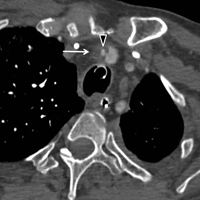Thrombosis of the innominate artery during prolonged cardiac support by right transaxillary Impella 5.0 device

Submitted: 20 May 2020
Accepted: 6 November 2020
Published: 18 March 2021
Accepted: 6 November 2020
Abstract Views: 610
PDF: 305
Publisher's note
All claims expressed in this article are solely those of the authors and do not necessarily represent those of their affiliated organizations, or those of the publisher, the editors and the reviewers. Any product that may be evaluated in this article or claim that may be made by its manufacturer is not guaranteed or endorsed by the publisher.
All claims expressed in this article are solely those of the authors and do not necessarily represent those of their affiliated organizations, or those of the publisher, the editors and the reviewers. Any product that may be evaluated in this article or claim that may be made by its manufacturer is not guaranteed or endorsed by the publisher.

 https://doi.org/10.4081/ecj.2021.9123
https://doi.org/10.4081/ecj.2021.9123








